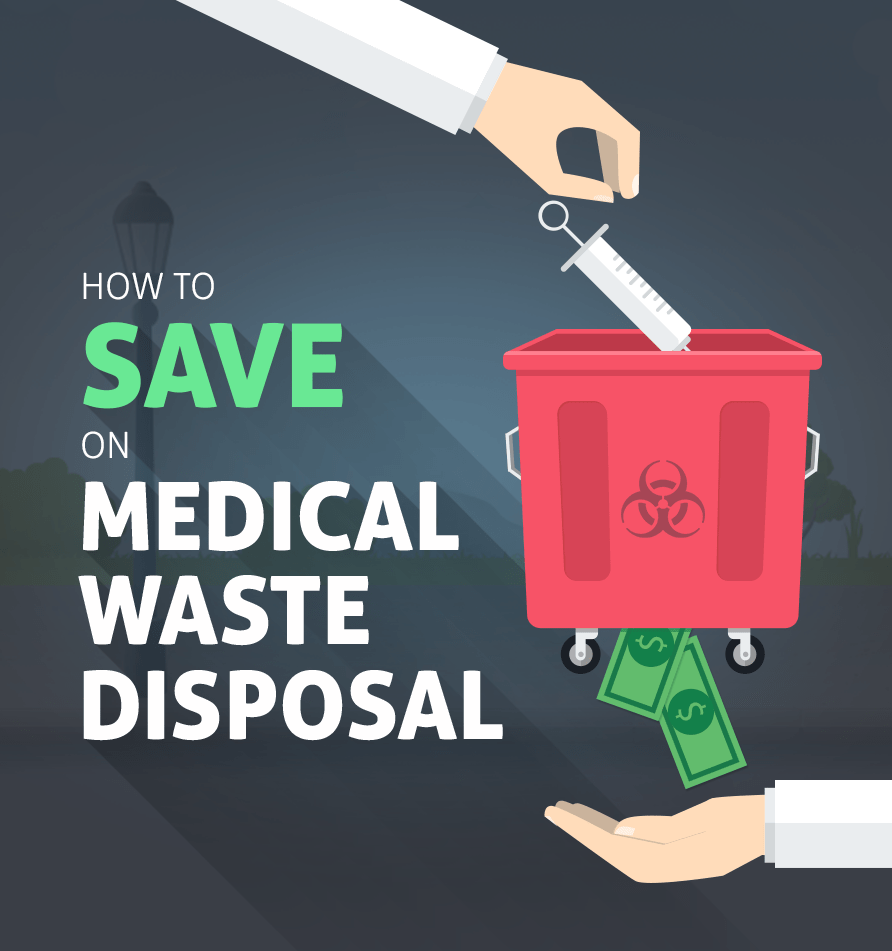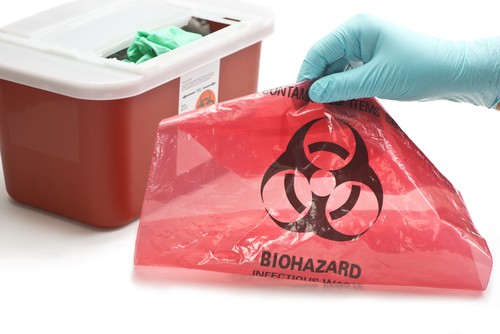Professional Medical Waste Disposal Service: Securing Your Center and Area
Wiki Article
Finest Practices for Medical Waste Management
Clinical waste administration is a vital facet of health care facilities' operations to make certain the security of patients, personnel, and the atmosphere. Implementing best practices in clinical waste monitoring is important to lessen the dangers linked with harmful waste.
Partition and Classification
In the field of clinical waste monitoring, correct partition and classification are necessary practices for making certain the efficient and risk-free disposal of healthcare-related materials. Medical waste is generated from numerous resources, including healthcare facilities, centers, labs, and other health care facilities. It includes a vast array of products, such as needles, syringes, bandages, handwear covers, and pharmaceutical waste.Partition involves the methodical splitting up of different types of medical waste based on their features and potential dangers. Sharps waste, such as blades and needles, ought to be put in puncture-resistant containers to prevent injuries and the spread of transmittable conditions.
Categorization is the procedure of identifying medical waste into different groups based on its potential risks. These groups might consist of contagious waste, harmful waste, pharmaceutical waste, and basic waste. By classifying waste, medical care facilities can identify the suitable disposal techniques and make sure conformity with neighborhood laws and standards.
Correct partition and classification of clinical waste not just secure the health and wellness of healthcare workers and the general public however likewise add to the overall effectiveness and efficiency of waste administration. It minimizes the danger of accidents, lessens environmental effects, and advertises responsible garbage disposal techniques.
Correct Storage and Labeling
To make sure the secure and effective disposal of medical waste, health care facilities must comply with appropriate storage space and labeling methods. WasteX Medical Waste Disposal. Proper storage and labeling play an essential function in keeping the stability of clinical waste monitoring systems and shielding the health and wellness and safety and security of healthcare employees, clients, and the publicWhen it comes to storage, it is necessary to have actually designated locations especially created for different sorts of medical waste. These locations need to be protected, well-ventilated, and equipped with ideal containers that fulfill regulative criteria (medical waste removal). Partition and categorization of waste should likewise be considered to stay clear of cross-contamination and prospective dangers

Normal surveillance and examination of storage space areas and containers are important to identify any kind of concerns or infractions. Team ought to be educated on proper storage space and labeling methods, highlighting the significance of conformity with regulations and protocols.
Safe Transport and Handling
Ensuring the safe and secure and proper transportation and handling of medical waste is crucial for maintaining the stability of waste administration systems and securing the health and wellness and safety and security of all entailed. Medical waste, which consists of things polluted with transmittable materials, pharmaceuticals, and other unsafe substances, need to be delivered in a manner that stops leaks, spills, and possible contamination.It is crucial to make use of watertight and puncture-resistant containers that are especially made for medical waste. Additionally, waste ought to be segregated based on its nature and type to avoid cross-contamination.
Throughout transportation, it is essential to ensure that waste containers are safely secured and stored in a secure fashion. Cars utilized for transporting medical waste must be outfitted with suitable safety attributes, such as spill control systems, to lessen the threat of any kind of leaks or spills. Drivers ought to get training on proper handling and emergency situation response treatments to properly attend to any kind of unpredicted cases.
Furthermore, the transport and handling of clinical waste need to adhere to all pertinent guidelines and standards established forth by neighborhood, state, and federal authorities. WasteX Medical Waste Disposal. medical waste disposal. Routine examinations and audits need to be performed to analyze compliance and determine any kind of areas for enhancement
Conformity With Regulatory Guidelines
Maintaining compliance with regulative standards is important for reliable clinical waste administration. These guidelines are implemented to safeguard public wellness and the setting by making certain that clinical waste is correctly taken care of, dealt with, and disposed of. Conformity with governing standards aids to stop the spread of infectious diseases, lessen possible hazards, and lower the overall effect of medical waste on the atmosphere.To attain conformity, health care centers have to remain educated concerning the details guidelines regulating medical waste administration in their jurisdiction. These policies might vary from nation to country, and even within various states or areas. It is necessary for health care facilities to have a detailed understanding of these standards and to implement ideal approaches and procedures to guarantee compliance.
One trick element of compliance is the correct segregation and labeling of different sorts of clinical waste. This consists of separating sharps from various other waste, as well as classifying waste based upon its possible threats. Medical care centers must additionally guarantee that medical waste is saved in appropriate containers and that these containers are appropriately classified and sealed.
Additionally, compliance with regulative standards calls for medical care facilities to develop correct training and education and learning programs for employee associated with clinical waste administration. This consists of providing training on waste segregation, handling, and disposal treatments, in addition to the appropriate use personal protective devices.
Regular surveillance and audits are also essential to make certain continuous conformity with regulatory standards. This entails conducting regular inspections of waste storage areas, documenting waste management procedures, and preserving records of waste disposal.
Efficient Disposal Methods
Medical care facilities need to use efficient disposal approaches for correct administration of clinical waste. Inappropriate disposal of medical waste can position major health and ecological risks. There are numerous techniques that can be utilized to effectively get rid of clinical waste, guaranteeing the safety of healthcare employees, individuals, and the general public.One typically used approach is incineration. Burners can safely shed clinical waste at heats, minimizing the quantity and ruining any potentially harmful pathogens. Incineration can be pricey and might release hazardous contaminants into the air if not appropriately managed.
One more technique is autoclaving, which includes subjecting the waste to high-pressure heavy steam. This procedure kills microorganisms, infections, and various other microorganisms, making the waste safe for disposal in routine waste streams. Autoclaving is a reliable and eco-friendly technique, but it needs specific tools and trained employees.
Chemical disinfection is also utilized in some cases, where fluid chemicals are applied to the waste to sanitize it. This approach is less generally used because of worries concerning the efficiency of chemical disinfection and the potential for chemical deposits to infect the environment.
Along with these approaches, healthcare centers must also carry out proper segregation, packaging, and labeling of clinical waste to guarantee its secure handling and disposal. Routine training and education of staff on correct waste administration techniques are critical to preserving reliable disposal methods.
Verdict
In final thought, carrying out ideal techniques for clinical waste monitoring is vital for ensuring the security of healthcare workers, individuals, and the setting. By properly segregating and classifying waste, saving and identifying it properly, making certain secure transportation and handling, complying with governing guidelines, and using effective disposal methods, health care centers can efficiently take care of and reduce the risks linked with clinical waste. It is crucial for health care companies to adhere and focus on to these best methods to preserve a lasting and secure health care environment.Medical waste management is a crucial facet of medical care facilities' operations to make certain the safety of individuals, staff, and the environment. Carrying out finest techniques in clinical waste administration is essential to reduce the dangers linked with hazardous waste. These categories might consist of infectious waste, unsafe waste, pharmaceutical waste, and basic waste.In conclusion, implementing ideal techniques for clinical waste management is vital for ensuring the safety and security of health care workers, clients, and the setting. By appropriately setting apart and categorizing waste, storing and labeling it correctly, making certain secure transportation and handling, complying with regulatory guidelines, and employing reliable disposal methods, healthcare centers can successfully more info here handle and minimize the dangers associated with clinical waste.
Report this wiki page